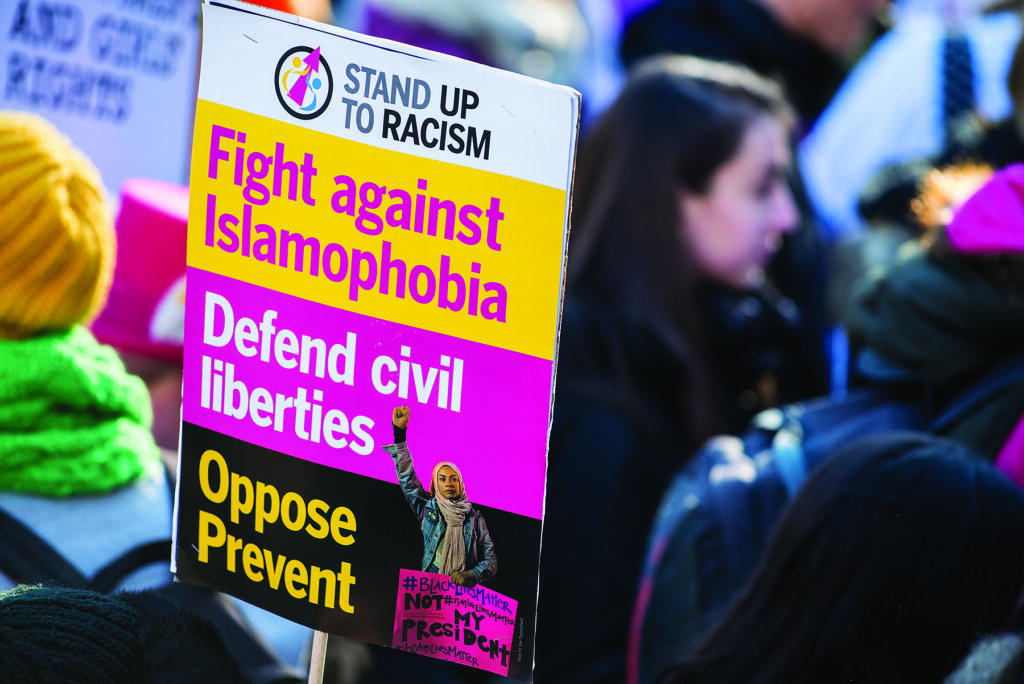
By Omer Bin Abdullah
March/April 2022
The Council of Islamic American Relations’ latest report on Islamophobia, a now-$1.5 billion racket in the U.S., names those organizations that fund the spread of this pre-pandemic malignancy.
Islamophobia is hardly a new phenomenon. It’s been around ever since the moment Prophet Muhammad (salla Allahu ‘alayhi wa sallam) declared “There is no deity but God.” When this became public knowledge, he and his Companions were targeted by Makka’s Islamophobes. As if he knew what would happen centuries later, he warned, “There will come a time when holding on to your religion will be like holding burning coal” (“Al-Tirmidhi,” 2260).
Over the following 1,400+ years, the world has seen many manifestations of Islamophobia, among them Pope Urban II’s (d. 1099) 1095 Speech of Clermont, which called for fellow Europeans to unleash the First Crusade “as Christ’s heralds to publish this everywhere and to persuade all people of whatever rank, foot-soldiers and knights, poor and rich, to carry aid promptly to those Christians and to destroy that vile race from the lands of our friends.” We may have heard some sort of regret for what followed, but “Sorry” is a valueless word when the hurt caused is not undone.
This strongly held prejudice sometimes manifests in ways that are beyond many people’s imagination: The Bush administration’s “war of choice” invasion and subsequent destruction of Iraq and the 20-year nightmare imposed on Afghanistan, just to mention a few.
Luke Peterson overviews this surging cottage industry and how its tentacles are working their way ever deeper into our society. He cites Prof. Jack Shaheen (d. 2017), who analyzed how 100+ years of Hollywood products continue to strengthen this enduring negativity and hostility.
But Islamophobia also serves a similar — and more sinister — purpose: as a tool for some to keep American support buoyed for their imperial dreams and for some to justify their colonial grab. After all, they’re simply giving the “terrorist,” “extremist,” “barbaric” — dear readers, please insert the prejudicial adjectives of your choice — Muslims what they deserve.
Trump and post-Trump, we have seen a quantum increase in Islamophobia, especially now that some hatemongers have become lawmakers and powerbrokers.
Now is the time that Muslims really need to stand resolute and together, even at the cost of worldly aspirations, to help their fellow Americans overcome this mentally and morally debilitating ailment.
Wakar Uddin reminds us of the Rohingyas’ continued sufferings at the hands of Myanmar’s religious bigots and the military. The Gambia v. Myanmar case, presented to the International Court of Justice on November 11, 2019, remains ongoing.
Sara Swetzoff takes us to Ethiopia, the ancient land that welcomed a group of Companions fleeing persecution – the First Hijrah. Rasheed Rabbi offers a vivid account of chaplaincy and how chaplains help people confront their challenges and trials.
In this issue, Islamic Horizons, which strives to introduce Muslim entrepreneurs who provide beneficial products and services, features Halal Pastures (healthy food) and Mango Creek (self-care products).
We also bid farewell to Zeba (Elisabeth) Siddiqui, author, and illustrator and part of the new wave of Muslim pioneers in the U.S.; Hashir Faruqi, who opened a Muslim chapter in journalism; Robert Crane (Faruq Abdul-Haqq), a beacon of learning and scholarship; Abdullah Bade, who freely shared his legal acumen to help MSA, ISNA and all those who sought guidance; Omar Afzal, an indefatigable striver with a flair for moonsighting issues; and Maulana M. Yusuf Islahi, a respected scholar and spiritual mentor who regularly visited the U.S. to share his learning.
This issue also includes South African journalist Ayesha Kajee’s memoriam for Archbishop Desmond Tutu, a solid friend of the Palestinians and a staunch opponent of the invasion of Iraq.